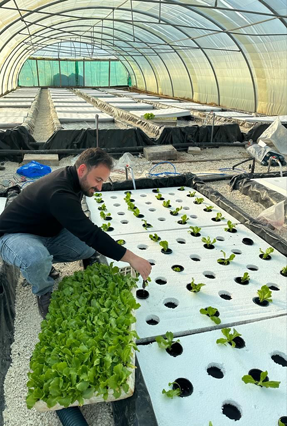AMMAN — The Jordan Farmers Union is urging the adoption of a two-pronged strategy that combines the power of afforestation with cutting-edge scientific research to cultivate climate-resilient plant varieties.
Jordan's arid climate and limited water resources make agricultural production a precarious endeavour. However, with rising temperatures and increasingly frequent and severe droughts due to climate change, local farmers are grappling with reduced yields and escalating water scarcity.
Mahmoud Oran, president of the Jordan Farmers Union, told The Jordan Times that climate change goes beyond temperature fluctuations.
"Climate change results in drought, water scarcity, the spread of wildfires and rising water levels, leading to floods and other natural disasters that have caused ecological deterioration," Oran said.
Oran underscored the urgent need for precautionary measures to mitigate greenhouse gas emissions, the primary drivers of climate change.
"This can be achieved by intensifying afforestation efforts to control emissions, as afforestation aids in reducing carbon dioxide emissions into the atmosphere by absorbing them,"Oran said.
Oran also emphasised the need for legislation to protect forests and impose stricter penalties on those engaged in deforestation, burning, or mistreatment of trees, as well as neglecting their care.
Rawan Hyasat, a resident of the outskirts of Amman, reported instances of tree cutting in her area for firewood preparation for the winter.
"When I first moved here, the area was densely wooded, more like a forest. However, every year, firewood traders arrive and cut down hundreds of old beautiful trees for profit," Hyasat told The Jordan Times.
Oran also highlighted the union's call for increased scientific research aimed at developing plant varieties adaptable to changing conditions, whether temperatures are high or low.
Naem Mazahreh, secretary general at the National Agricultural Research Centre (NARC), said the centre is importing various types of vegetable seeds and feed suitable for Jordan's changing atmosphere.
“NARC is committed to intensifying its research efforts aimed at increasing agricultural production, which is considered the cornerstone of enhancing food security in the Kingdom," he said.
Mazahreh added that this is achieved by improving water productivity, which includes enhancing water usage efficiency and implementing water-saving smart irrigation systems.
Moreover, the centre has conducted tests to explore the hypothesis that utilising treated water in fodder production is beneficial and does not pose health risks or environmental pollution.
For field crops, Mazahreh added that the centre has undertaken research for over two decades across five research stations, representing most of the rainfed areas within the Kingdom.
"Three wheat varieties and three barley varieties have been introduced, each representing the best choice for their respective locations," Mazahreh said.
Moreover, the National Seed Bank, which was established by the NARC, has a collection of various plant species including 1,532 samples of local strains of traditional varieties, which carry adaptive genes for local environments due to their selection by farmers over time.
It also includes 1,558 samples of wild ancestors of commercially important varieties worldwide. In addition, the bank contains numerous medicinal plants (294 entries) and forage shrubs (49 entries). This seed bank supplies researchers with these varieties for multiplication and testing their resilience to various climate-related stressors, such as humidity, salinity and temperature, he added
Muthana Mohasen, a hydroponic farmer, told The Jordan Times that under the influence of climate change, hydroponics and aquaponics stand as the most sustainable and climate-resilient agricultural methods.
"Hydroponic systems use significantly less water compared to traditional soil-based agriculture,” Mohasen said. “These systems are typically grown in controlled environments, such as greenhouses or indoor facilities, allowing precise control over temperature and humidity.”
